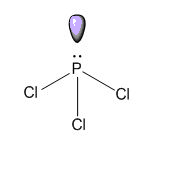Question
Question: What kind of a molecule in \(\text{PC}{{\text{l}}_{\text{3}}}\)? A.) Ionic B.) Polar covalent ...
What kind of a molecule in PCl3?
A.) Ionic
B.) Polar covalent
C.) Non- polar covalent
D.) Coordinate
Solution
Bond polarity is determined by electronegativity difference between the atoms, while polarity of a molecule is determined by dipole moment.
PCl3 Shows structural similarity with NH3 and both the molecule are polar molecule.
Complete Solution :
Dipole moment is a vector quantity, and the dipole moment of a polar molecule depends on its geometry. A symmetrical molecule or having a regular geometry, is non- polar even though it contains polar bonds because in a symmetrical bond dipole of all the bonds cancel out by each other. Only the molecule which has an asymmetrical shape has a dipole moment.
- In PCl3, the central phosphorus atom is attached with three chlorine molecule by covalent bond and, has a lone pair. PCl3 has distorted structure due to the presence of lone pairs of electrons.

(A) PCl3 Is contains three covalent bond which are formed by equal sharing of electron in between phosphorus atom and chlorine atom, hence it’s a covalent molecule.
(B) PCl3 Molecule is an asymmetrical molecule, and has a net dipole moment. So, this is a polar covalent molecule.
(C) Due to the absence of molecular symmetry, PCl3 has a net dipole moment, so it is a polar molecule.
(D) Coordinate bonds are formed by unequal sharing of electrons in between the two atoms. In PCl3 only covalent bonds are present hence it is a covalent molecule.
So, the correct answer is “Option B”.
Note: - Dipole moment in a polar covalent bond is equal to the product of induced charge on covalently bonded atoms and their intermolecular distance.
-Dipole moment depends upon the symmetry of the molecule, and symmetry of the molecule is mainly determined by the presence of lone pairs and bond pairs of central atoms.
